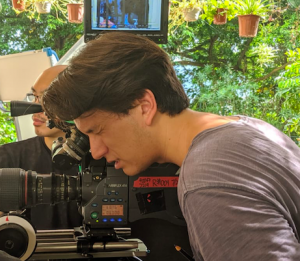‘We don’t dance for nothing’
‘We don’t dance for nothing’
 Interview with Director Stefanos Tai
Interview with Director Stefanos Tai
By Michelle Chermaine Ramos
The Phiippine Reporter
We Don’t Dance for Nothing is a different kind of film about the lives of Filipino domestic workers in its execution and approach to storytelling. The story is told through the eyes and memories of H (Miles Sible), who plans to escape her life feeling trapped working as a nanny for a Chinese family in Hong Kong. Like fragments of memories, the movie is shot in a series of choppy stills with minimal smooth motion until the end. The effect is unsettling and designed to let the viewers share the characters’ sense of feeling trapped where they are. The movie touches on the plight of OFWs, Hong Kong protests and LGBTQ+ themes.

Director Stefanos Tai
It was shot from March to May of 2020 in the early stages of the pandemic with the support of the government in Hong Kong and over a hundred domestic workers and premiering at the DOXA Film Festival in Vancouver and the Inside Out Film Festival in Toronto. Described as a photo-montage love letter to the Filipina Domestic Workers of Hong Kong, director Stefanos Tai shows them beyond their job descriptions and stereotypes by capturing them as people with hopes, dreams and talents. He shares his thoughts in this interview.
THE PHILIPPINE REPORTER: How did you come up with the idea to write this film?
STEFANOS TAI: Four years ago, I moved to Hong Kong and was feeling a bit like I didn’t fit in properly in the city. It felt quite corporate to me. It wasn’t really what I expected and I went there for work. Then one Sunday, I was just walking through the city and saw thousands of women in bright colors dancing and laughing and eating and calling their friends and crying. It was just such a display of humanity in one place. I asked my friends, who are these people? I wasn’t aware of the fact that Hong Kong has so many domestic workers from the Philippines. They sort of naturally became my friends and I learned of their stories, and the struggles they face. They became my heroes, really. And I learned that dance to them was not just a hobby that they did for fun, but a way for them to release all the stress on their one day off. You know, there’s news about them and articles have been written. I found that all that stuff didn’t capture the magic that I felt on those Sundays. So I wanted to make something that showed them in a more beautiful, colorful light.
TPR: How did you write the Tagalog part of the script?
ST: A lot of the script was based on real memories people shared to us. Obviously, I don’t speak Tagalog so I was told the stories in English. I wrote a script in English, and then on set I would talk with the actors about the purpose of a scene and the characters. But really, I can’t take credit for it. They had so much free rein to improvise lines and what resulted was a kind of authentic back and forth conversation. A lot of very funny jokes that I never could have written. Later, it was really just about translating what they had said on set. So it was good for me to step out of the way because they did such a great job.
TPR: Did you cast actors who were already dancers?
ST: Casting was spearheaded by our casting director, Kate Sullivan, who is amazing. We wanted to cast real domestic workers because we felt it would be the only authentic way to show the community. The problem was that it’s actually illegal in Hong Kong to hire domestic workers for anything other than domestic work and many of their employers would not have allowed it even if the law had allowed it.
Also, schedule wise it wouldn’t be an option to hire real domestic workers for 30 shoot days. But what we quickly discovered was that there’s a massive pool of Filipino talent in Hong Kong who the traditional Hong Kong movie and TV industry almost ignores. We started doing auditions and it’s a lot of word of mouth, a lot of Facebook posts. It wasn’t a traditional casting effort. Also, COVID made things a bit more complicated.
We would ask these folks are you able to dance also? And most of the time, they would say, oh no, I’m not really a dancer. And then we’d say, are you open to learning? Do you have a video of yourself dancing? Then I would see these videos where they’re doing handstands and flips and splits. And I’m thinking, how do you not think you’re a good dancer? You know, I come from New York and all the actors say they can do 20 different skills, like riding horses and speaking French and they can’t always do all those things. So it was interesting to see how they were very humble about it.
TPR: It looked like a fun shoot. So that flash mob scene happened because volunteers invited their friends?
ST: Exactly. It’s word of mouth. We had over 100 domestic workers who volunteered. They just wanted to be in the film so we scheduled our shoot on a Sunday when they had off time. I think it’s kind of a sad fact because we were the first film that ever in Hong Kong really tried to show domestic workers as more than just their job descriptions, and that is so overdue. I think that’s the reason why there was so much enthusiasm for people to help us shoot, whether it’s acting or crew or locations or food. We’re honored that we have that help. But also, I think it’s a sign that there’s a lot of work to be done to better represent this community. It’s not a small community. You’ve got almost 400,000 domestic workers. Over 50% of them are Filipino so it’s really about time that they have their moment of representation.
TPR: What do you hope people will take away from watching this film?
ST: I hope people in Hong Kong will realize that the women who keep the city running by being domestic workers are more than that. They have hopes and dreams, regrets, talents and passions, just like everybody else, which sounds obvious to say, but I’ve met a lot of people who I felt did not understand that. And for the wider world, I just hope that people know that this community exists, that these folks are not only in Hong Kong, but all around the world here in the US in Canada, Europe, other cities in Asia, the Middle East. And I think the film is really about bringing dignity to the people that inspired me and really became my heroes.
Comments (0)